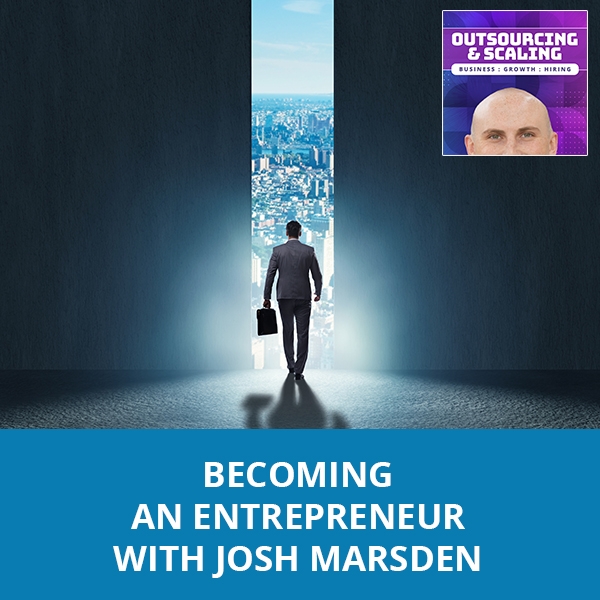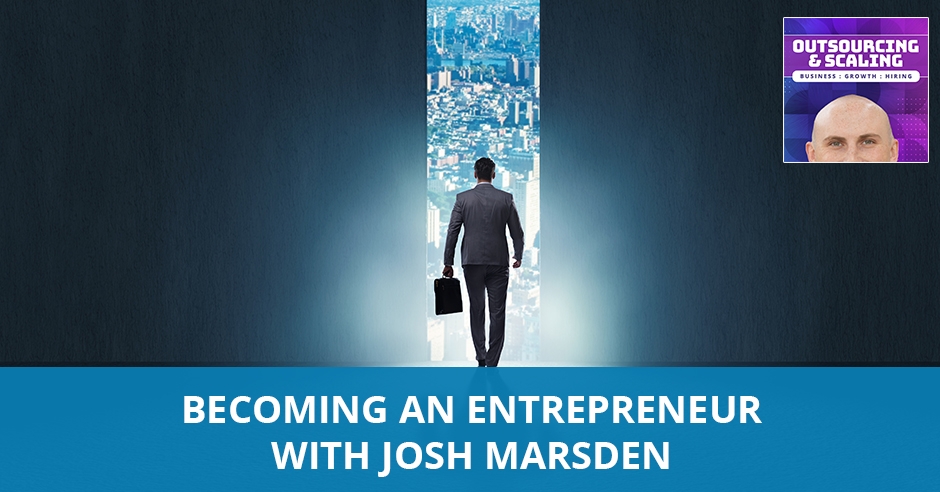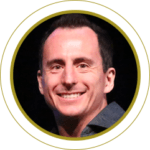


Being an entrepreneur is neither a part-time or a full-time job, it’s a lifestyle. Becoming one unlocks your freedom to make your own decisions. Josh Marsden, the founder of CVO Acceleration – a company that helps eCommerce businesses scale their businesses using paid traffic – talks about his shift from having a job with corporate America to doing freelance work and eventually starting his own company. Josh shares how he aligned himself with one of the leaders in digital marketing, how advertising has changed in 2019, and what to look for when hiring people.
—
Listen to the podcast here:
[smart_track_player url=”https://www.podetize.com/statsapi/www.podetize.com/wp-content/uploads/fileuploads/11-5b145ef137b51b3d1af0633e9305c43d/04/2019/428f75071945177fccac73b013807f72.mp3″ title=”Becoming An Entrepreneur with Josh Marsden” artist=”Nathan Hirsch” image=”https://freeup.net/wp-content/uploads/2019/04/OAS.png” ]
Download the audio file here.
Becoming An Entrepreneur with Josh Marsden
I’m here with special guest Josh Marsden. Josh, how are you doing?
I’m doing good. How are you?
I’m doing good. Josh is an MBA graduate, author and Founder of CVO Acceleration. He’s been on various media outlets and blogs including Entrepreneur on Fire, SuperFastBusiness, the Huffington Post, DigitalMarketer.com. I saw you speak at Traffic & Conversion and BigCommerce.com, to name a few. In addition, he’s been on stage at DigitalMarketer and Traffic & Conversion several times. His companies CVO Acceleration specializes in helping eCommerce companies use online advertising, profitability at scale. What I want to do is take us back before you got into eCommerce, before you got into marketing, what were you doing? Are you rebel or you a straight-A student?
I was born in Germany. We moved around a decent amount. I was in Texas for five years. My dad was stationed there in Central Texas. That’s where my childhood was. I even had my first entrepreneur spark when I was that age. This is probably around eight years old. What I did was I borrowed Nintendo games and I rented them out to other kids. I didn’t even own a Nintendo, I was that middleman, like Napster for video games but a person not an online website. That’s what I was doing, but I was also selling in the process. Fast forward my dad got out of the military when I was eleven. We moved to Arizona. I’ve been in the Phoenix area of Arizona for 26 years. I went to Arizona State University for a bit and then I decided to go to the military when I was nineteen. I had to get a little bit more serious about life. A little bit more responsible and disciplined. I had to get that discipline back that I used to have when I was a kid. When I was a kid, I was a straight-A student. I wasn’t allowed more than two E’s.
I was a TAG student, which is this program in Texas. It’s an accelerated learner type program. Then I was in honors in high school. At some point later in high school, I went in the wrong direction in a way. I didn’t get involved with drugs, alcohol or anything. I made bad decisions. I took my relationship more seriously than school, my college, work and I was making bad decisions. Then after she broke up with me, I had to get myself back on the right track and that’s why I went to the military. That was a good move for me. It was the first domino that helped me get back on the right path. It helped me get back to school, take it seriously and do well. The rest is history. After that, I went into corporate America. I worked at the University of Phoenix. I was there for seven years and I was a manager for four of those years. For three years, I was an advisor and I did pretty well. I was in the top 3% of the company at various points throughout my career there and won awards. I was almost at six figures, which I thought was a big deal at the time.
What happened was I decided to leave that company for a few reasons. Back in early 2012, the company itself has some challenges in the private education sector. They weren’t giving us raises as often anymore. The raises were small compared to the past. Opportunities were dwindling and I wanted to become a director at the time. I decided to take a leap and move to Infusionsoft. I was selling software for Infusionsoft. I did okay. I was there throughout 2012 but I wasn’t happy. I had been a manager prior to that, so I was used to being a sales manager, even though we didn’t call it sales at the University of Phoenix. I had performance expectations. I didn’t like getting back into a sales role. I felt I had climbed that mountain. I’d moved on from it. Even though I was 108% to quota, the entire year of 2012, I wasn’t happy. I think my manager could tell. At the end of 2012, he had a conversation with me. He let me go.
There’s a little bit back and forth, but I eventually accepted that this wasn’t the right fit and I left. That was when I started into becoming a business owner, an entrepreneur because at that moment in time, I needed to make some money. I got a job offer the same day I was let go. That wasn’t going to start until 45, 60 days later. I started doing freelance work on Elance and Odesk, which is now merged in UpWork. I was able to make some money and see that I could make money on my own for the first time in my life besides being eight years old. At that point, I definitely thought about starting my consultancy, my agency, but I didn’t do it right away. I started at another company with the job. I’ve literally told them on the first day that I had to leave 5:00 PM one to three times a week to pick up my son from preschool. They gave me a hard time about it.
Being an entrepreneur gives you the freedom to make your own decisions.
They said, “I don’t know about that. Our culture here is you got to be here until seven. You got to work hard, you got to put it in the long hours.” I went back and forth with them and I strung them along a little bit. I was working out with his mom and I wasn’t. I was stringing it along. Finally, at the end of three weeks at that new company, they gave me an ultimatum and they told me on a Friday leading into the weekend that I had to let them know my decision. That weekend, I sat down to a table and went over starting my own company versus staying at that company. Positives, negatives and brainstormed it out. I wrote it on paper. That made my decision for me that I had to start my own company. I had to become independent. I had to create the life that I wanted, this way I could be the father that I wanted to be and the rest is history.
I had an internship in college and before that, but I’ve never had a real job. What’s something that I might have missed out on because I wouldn’t want to do it, but I wish I had some of that experience in my back pocket.
There are pluses and minuses to both sides of the fence. When you work for a company, when you work for a corporate entity, for one, it’s somewhat easier to say, “At 5:00, 6:00, I’m done. I’m not going to think about work. I’m going to go home and relax. I’m going to play video games or watch a movie, go to the gym or whatever.” I was always a type A. I was always the type of guy that had to do like better than everybody. I was always pushing hard. Even in corporate, I was the same way. I didn’t jive with everybody because of that but I could still get to a point at some point in the evening after I got home, I was still able to let go and relax. Whereas as a business owner, I don’t know about you, but I can’t necessarily relax very easily. I always want to work. It’s a good and a bad thing. It’s a good thing because, I love what I do, but it’s a bad thing because I can’t unwind very easily. It takes a lot for me to unwind. That’s one difference that I can tell you about. Besides that, the other biggest thing that maybe I do miss a little bit about the corporate world is relationships.
When you are in cubicle land and you’re working at a corporate company with cubicles everywhere, I was literally in buildings with hundreds of cubicles. I can see all these different people and you make friends, you build relationships, you go out to happy hours. It’s easy to meet people and to have fun relationships. I had some great friends when I was at the University of Phoenix. That’s something that’s different about entrepreneurship, being a business owner. You really have to make a little bit more of an effort to be around people and to make friendships in similar lines of work. You have to go to Meetups. You have to go to events and things like that to be able to mimic what happens naturally in the corporate environment. Those are the two biggest things. There are ceilings to how much you can make when you’re working for a corporate company. You do have benefits, health and insurance but you can get that as a business owner as well. That’s pretty much it. That’s the comparison between the two.
Let’s make that shift. You went from the job and you left it. You’re starting to become an entrepreneur. Talk about year one. I know my year one was like on both my companies. What was it like?
At first, it was, it was fun. At first, I felt this joy of having freedom. I was able to go to the gym during the day, get a good solid workout in and not feel any stress about it, not getting someone on a case about it. I had the freedom to make my own decisions. I had to do it with responsibility in mind and wisdom. I was able to get clients pretty quickly. The highest point I hit in 2013 was $10,000 in a month which isn’t a lot now, but then it was. That was a good feeling and it definitely helped me to have the sales background, being able to get on the phone with people, have those conversations, move them to a decision and get decisions to come on board.
I did definitely have some challenges as well. The biggest challenge I had was I did get to a point later in 2013, where I felt that it was time to bring on an employee. I took a little bit of a risk, a chance on a super close friend of mine, literally my best friend. It didn’t work out, unfortunately. I don’t want to say he did it because it’s my business, I own it. There was a lot that happened there that caused us to lose a lot of clients pretty quickly. I remember going into December of 2013 with 2,000 projected and that wasn’t enough to cover my bills. My bills are lower at the time, but it wasn’t enough. I was stressed. I had to hustle. I had to work day and night.

I had to sell. I had to apply for different opportunities on freelancer sites. I had to grind it to get the health back that I needed to be able to have that stability. That was my first year. It was testing the waters and making those decisions, having those experiences, feeling those benefits and figuring out which way I was going to go. I initially started as doing Infusionsoft marketing automation services. I learned the software quickly because I’m good at technology. I found out that I didn’t want to do business automation. I wanted to help companies grow because I love the performance. I love to see the results. That was a decision I made in 2014 to niche down into that. That’s how the first year went.
Let’s talk opportunity because I always say one of the biggest opportunities I got was when an influencer finally said yes to me. His name is Ben Cummings. Ben, finally said, “I’m going to give you a chance. I’m going to promote you to my community, but you better take great care of them.” I went all out to make sure that people had a great experience and, in my opinion, took advantage of that opportunity. Was there a moment where you said, “This is a big opportunity. I didn’t want to blow this?”
Many times, which one do you want to know?
Give us your first one where you said, “This could really get us on the right track.”
First off, I am very thankful for every client that we bring on board. I think of every client as a big opportunity and I do to this day. I preach that with my team even though I’m not as front facing as I used to be years ago. It’s something that I preach to my team and one of our core values is people. There’s a lot that goes into that. Probably the biggest domino happened when I decided to commit to focusing on marketing. My bachelor’s degree was in marketing. My MBA is in general. I definitely had some marketing in my foundation, but I didn’t have online marketing knowledge. I’ve dived into materials, books and online courses, blog posts, podcasts, you name it. Being a type A, if I say I’m going to try to become the best I can in something, I go all out, I do whatever I have to do to get to that point and to get as close as possible to being what that is. In 2014, when I was doing marketing campaigns for companies as with my clients, that’s what I love. I love seeing the results.
I decided that I was going to focus on that. I was going to focus on marketing campaigns. I didn’t call it marketing funnels at the time. I was going to focused on generating results for clients. I dove into materials and DigitalMarketer was the biggest resource that I really dove into. DigitalMarketer Lab had launched around that same time. I became one of the first members and I became an influencer in their group, especially in regard to Infusionsoft initially. Late in 2014, I’m in Austin, Texas. I’m at one of their events. It’s funny because the event was free for the first two days and if you wanted to pay for the third day, you pay $500 and you can upgrade and you can be there for the third day. I did because I wanted to learn as much as possible. That third day, I’m there and they pitched to the entire room. We’re rolling out this new program, DigitalMarketer Certified Partner. It’s $10,000. It’s a beta group, this is what we’re promising. At the time my friend Rich and I both had agencies. We were frenemies as he calls it.
We were friendly but competitive. We were after the same leads. We were cleaning the house in the Facebook group for DigitalMarketer of getting leads, clients and selling Infusionsoft. He gets up right away, right when Ryan pitches that, he gets up and almost runs to the front of the room. I’m thinking to myself, “I need to do this too. I can’t let Rich one-up me on this. I got to get up there because I’m super competitive.” Even though I don’t really have $10,000 I could invest, I’m like, “I’ll do it.” I jump up, bring the paperwork, turn it in, boom. The next 30 days I did make $10,000 to be able to pay for that, which is cool. That was the biggest opportunity because I aligned myself with arguably the leader or one of the leaders in digital marketing, online marketing and that was a huge opportunity. I’ve always taken it very seriously since. That was the biggest opportunity that I’ve had.
When advertising online, you have to focus on the customer value journey.
It’s so funny how that small thing, in that second, if you decide, “I didn’t want to do it or I don’t have the money,” or whatever it is. It could be a completely different path. We talk a little bit about hiring people. You hired your friend. I did that back in the day. I remember after I fired two or three of my friends. I can’t hire friends anymore. This is brutal. Let’s talk about hiring. You have a team. What do you look for when you’re hiring people?
The first thing is a character. I want people that align with the characters that I want to imbue into my business. I’ve got specific values. I go over that in our hiring funnels that we drive people to sometimes. In this video that I typically show candidates before I interview them, I’m going over what I’m looking for and especially what I’m not looking for. I’m looking for people that have integrity, hardworking, want to be the best that they could possibly be and will go the extra mile. Those are some of the characteristics. Really good with people, interpersonal communication, I definitely like to look for leaders that can make quick decisions that are unafraid of taking those types of roles. This way they’re hungry for growth. That’s from a character standpoint. From a knowledge standpoint, it depends on the role as you can imagine. I’m always looking for the skillsets that matched the role as well.
Let’s talk about CVO Acceleration. What is it? How has it evolved? How has it changed?
We focus on helping eCommerce companies be able to use paid advertising profitably at scale. What that means is we help eCommerce companies that are usually doing seven plus figures. We help them scale their business using Facebook ads, Google ads, Bing, Yahoo and Pinterest, even. We have the in-house processes and resources to be able to help our clients do that. Besides paid advertising, we also can help with sales funnels, chatbots, Facebook messenger bots, email marketing and SMS marketing. It’s all baked into our funnels basically. Our job, our role, our mission is to help companies be able to use paid advertising, using everything that we can do to help them maximize their ROI from paid advertising.
How has advertising changed in 2019 and where do you see it going?
My book is probably the best resource that anybody can grab. It’s on Amazon where you can go to my website. Here’s the gist of it. First off, you can’t rely on Facebook even though this is about Facebook ads. Facebook ads are, next to Google, definitely the best advertising channel still. It definitely has become more competitive. Cost per clicks has gone up. You do have to have a good strategy that matches the trend that’s happening on Facebook and has been happening on Facebook for the past year or two. That’s combining brand with direct response. That’s what it comes down to. There’re definitely different strategies, tactics and things like that that can help companies implement that combination with their Facebook ads. That’s covered in my book by myself and full of other friends that really contributed to the book. They’re all experts as well in Facebook advertising. That’s what’s happening with advertising online. You have to really focus on the customer value journey.
The brand plus direct response and you have to have smart retargeting throughout all your advertising. You are moving people from stage to stage and you’re respecting where they’re at in the process of converting. Also on top of that, you’re not focusing on the 1% to 2% of people that are ready to buy. You’re focusing on a larger percentage plus those people. This way you can get people into your funnel and you can move them through until they’re ready to make a decision to become a customer. You can’t over-rely on one paid channel. Omnichannel is the trend. If you Google search what’s the trends with digital marketing, Omnichannel comes up and it’s true. You can’t overly rely on Facebook. You can’t overly rely on Google. You have to have a multichannel strategy to be able to maximize your return on every dollar spent. Those are the two biggest things that I can talk about without going too much into the end of the weeds that your audience would benefit from hearing.

Josh, this has been awesome. How can people find out more about you?
I would just recommend going to our website CVOAccel.com. CVO stands for Customer Value Optimization. We help our clients be able to optimize customer value because that’s how you win online. Go to our website and you can find out more about us.
Thanks so much for coming on.
Thanks, Nathan. I appreciate it.
Important Links:
- CVO Acceleration
- Infusionsoft
- Ben Cummings
- CVOAccel.com
- DigitalMarketer.com.
- Traffic & Conversion
- BigCommerce.com
- DigitalMarketer Certified Partner
About Josh Marsden
 Josh Marsden is an MBA Graduate, Author, and Founder of CVO Acceleration. He’s been in or on various media outlets and blogs, including Entrepreneur on Fire, SuperFast Business, The Huffington Post, DigitalMarketer.com, BigCommerce.com, just to name a few.
Josh Marsden is an MBA Graduate, Author, and Founder of CVO Acceleration. He’s been in or on various media outlets and blogs, including Entrepreneur on Fire, SuperFast Business, The Huffington Post, DigitalMarketer.com, BigCommerce.com, just to name a few.
In addition, he’s been on stage at Digital Marketer’s Traffic and Conversion Summit several times. His company, CVO Acceleration, specializes in helping E-Commerce companies use Online Advertising profitably at scale.
In 2001, I ended up joining the Arizona Army National Guard, following in my dad’s footsteps. College wasn’t working out for me and I needed another road to help me grow up while building skills I could use later in life.
I passed the rigorous Air Traffic Control school with flying colors when many people didn’t finish. At 3 C Grades on exams, you would be kicked out of the program as a way to prepare you for the stress that you would face as an Air Traffic Controller.
